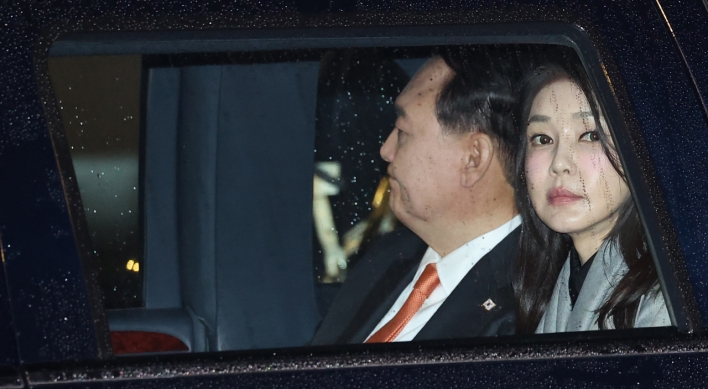[ANALYST REPORT] US anti-Dumping tariffs are credit negative for Korea’s steelmakers: Moody‘s
By 박한나Published : Aug. 1, 2016 - 15:24
On 22 July, the US Department of Commerce announced that it will impose anti-dumping tariffs on Korean cold-rolled steel sheets, specifically a 64.7% duty on POSCO’s (Baa2 negative) coldrolled sales in the US and a 38.2% duty on Hyundai Steel Company’s (Baa3 positive).
The move is credit negative for Korea’s steelmakers because it will force them to either accept lower export prices or divert sales to other countries, either of which will negatively affect sales and earnings during a period of intense competition and global oversupply.
The latest duties follow the Commerce Department’s decision in May to impose an average 28.3% duty on Korean corrosion resistant steel products.
The immediate effect of these duties will be manageable for POSCO and Hyundai Steel because the affected products account for a relatively small share of their total sales.
POSCO’s cold-rolled sales in the US amount to about 100,000 tons annually, or 0.3% of its total sales volume in 2015. However, there is a risk that the US government will take similar actions on other types of steel products, given the increasing protectionism amid a sluggish domestic steel industry.
Several media outlets have reported that the US government could impose anti-dumping tariffs on hot rolled coil products from Korea as soon as this month. Hot-rolled coil products are a major export for Korean steelmakers.
If the US were to expand the scope of steel products subject to anti-dumping tariffs, it would have a meaningful negative effect on Korean steelmakers’ operations.
The US is a major export market for the steelmakers, with POSCO generating about KRW2.2 trillion in revenue from steel sales in North America in 2015. That amount constituted about 9.9% of POSCO’s total steel exports or 7.6% of its total steel revenue for third parties.
So far this year, the US government has taken similar action on steel imports from other Asian countries, including China, Taiwan and Japan. In May, the US government imposed a record-high 522% tariff on Chinese cold-rolled steel sheets.
Increasing trade friction between Asian steelmakers and the US and European Union since 2015 is likely to hinder export activities and exacerbate the persistent overcapacity in Asia.
Steel mills in Asia have so far made efforts to increase exports to developed economies to counter declining steel demand in China. This factor, together with a continued decline in Chinese demand, should keep Korean steel companies’ profitability low at least over the next 12-18 months.
Source: Moody‘s Investors Service
The move is credit negative for Korea’s steelmakers because it will force them to either accept lower export prices or divert sales to other countries, either of which will negatively affect sales and earnings during a period of intense competition and global oversupply.
The latest duties follow the Commerce Department’s decision in May to impose an average 28.3% duty on Korean corrosion resistant steel products.
The immediate effect of these duties will be manageable for POSCO and Hyundai Steel because the affected products account for a relatively small share of their total sales.
POSCO’s cold-rolled sales in the US amount to about 100,000 tons annually, or 0.3% of its total sales volume in 2015. However, there is a risk that the US government will take similar actions on other types of steel products, given the increasing protectionism amid a sluggish domestic steel industry.
Several media outlets have reported that the US government could impose anti-dumping tariffs on hot rolled coil products from Korea as soon as this month. Hot-rolled coil products are a major export for Korean steelmakers.
If the US were to expand the scope of steel products subject to anti-dumping tariffs, it would have a meaningful negative effect on Korean steelmakers’ operations.
The US is a major export market for the steelmakers, with POSCO generating about KRW2.2 trillion in revenue from steel sales in North America in 2015. That amount constituted about 9.9% of POSCO’s total steel exports or 7.6% of its total steel revenue for third parties.
So far this year, the US government has taken similar action on steel imports from other Asian countries, including China, Taiwan and Japan. In May, the US government imposed a record-high 522% tariff on Chinese cold-rolled steel sheets.
Increasing trade friction between Asian steelmakers and the US and European Union since 2015 is likely to hinder export activities and exacerbate the persistent overcapacity in Asia.
Steel mills in Asia have so far made efforts to increase exports to developed economies to counter declining steel demand in China. This factor, together with a continued decline in Chinese demand, should keep Korean steel companies’ profitability low at least over the next 12-18 months.
Source: Moody‘s Investors Service



![[AtoZ Korean Mind] Does your job define who you are? Should it?](http://res.heraldm.com/phpwas/restmb_idxmake.php?idx=644&simg=/content/image/2024/05/06/20240506050099_0.jpg&u=)














![[K-pop's dilemma] Is Hybe-Ador conflict a case of growing pains?](http://res.heraldm.com/phpwas/restmb_idxmake.php?idx=642&simg=/content/image/2024/05/07/20240507050746_0.jpg&u=)